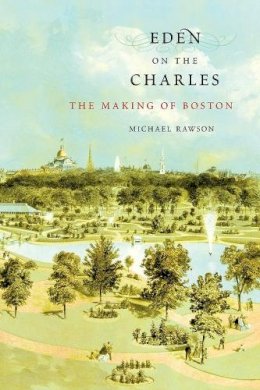
Eden on the Charles: The Making of Boston
Michael Rawson
Drinking a glass of tap water, strolling in a park, hopping a train for the suburbs: some aspects of city life are so familiar that we don’t think twice about them. But such simple actions are structured by complex relationships with our natural world. The contours of these relationships—social, cultural, political, economic, and legal—were established during America’s first great period of urbanization in the nineteenth century, and Boston, one of the earliest cities in America, often led the nation in designing them. A richly textured cultural and social history of the development of nineteenth-century Boston, this book provides a new environmental perspective on the creation of America’s first cities.
Eden on the Charles explores how Bostonians channeled country lakes through miles of pipeline to provide clean water; dredged the ocean to deepen the harbor; filled tidal flats and covered the peninsula with houses, shops, and factories; and created a metropolitan system of parks and greenways, facilitating the conversion of fields into suburbs. The book shows how, in Boston, different class and ethnic groups brought rival ideas of nature and competing visions of a “city upon a hill” to the process of urbanization—and were forced to conform their goals to the realities of Boston’s distinctive natural setting. The outcomes of their battles for control over the city’s development were ultimately recorded in the very fabric of Boston itself. In Boston’s history, we find the seeds of the environmental relationships that—for better or worse—have defined urban America to this day.
Product Details
About Michael Rawson
Reviews for Eden on the Charles: The Making of Boston
Michael Patrick Brady
Boston Globe
Rawson examines the city of Boston in the 19th century and how its inhabitants constructed not only a city, but also a new way of looking at the connection between people and the natural world that defined what it means to be urban… The author focuses on how Bostonians transformed Boston Common into a public park, created one of the earliest U.S. urban water systems, and helped invent the idea of the pastoral suburb. This urban case study explores the changing nature of environmental relationships and the leading role that the city of Boston played in the process. As such, this readable work makes a valuable contribution to urban historiography.
T. A. Aiello
Choice
By tracing the myriad shifting connections between Bostonians and the natural environments that have sustained their lives, Rawson’s Eden on the Charles offers vital new perspectives on the human place in nature and how people think about it—not just for Boston, but for all American cities, past, present, and future.
William Cronon, author of Nature’s Metropolis: Chicago and the Great West In lucid prose and engaging detail, Rawson charts how nineteenth-century Bostonians struggled with nature and one another to craft America’s original city upon a hill. As he concludes, Boston not only shaped our nation’s urban past but also charted its metropolitan future. Anyone who reads Eden on the Charles will see all American cities in a new, powerful light.
Matthew Klingle, author of Emerald City: An Environmental History of Seattle With clear and insightful prose, Rawson effectively intersects ideas of nature and urban growth in a fine treatment of Boston. As he demonstrates so well, it is impossible to examine the history of urban places without understanding how they connect with the world in which they evolve and mature. The book will take a central place among other historical treatments of this magnificent city.
Martin V. Melosi, University of Houston A loving and thorough history of nineteenth-century Boston debates about suburban settlement and the major public works of the era. It is a fine exposition of what seems now to be holding us back from adapting to the needs of the twenty-first century.
Sam Bass Warner, Jr., author of The Urban Wilderness and Province of Reason
